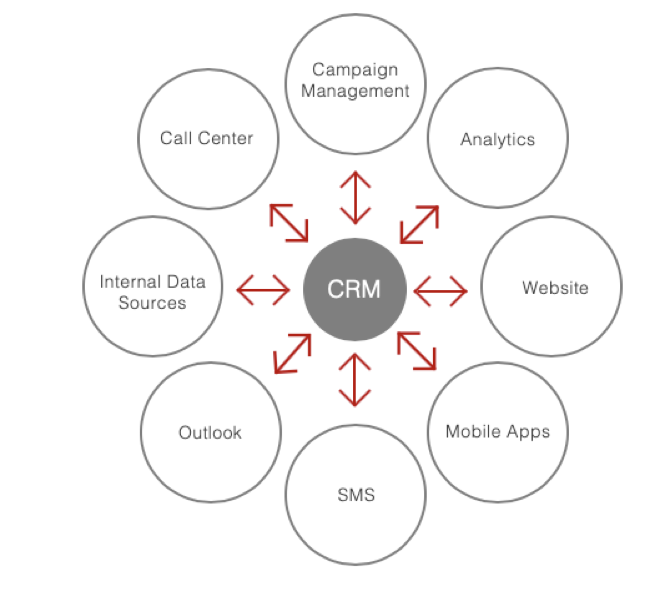I’m following up on my original post that a traditional CRM project is no longer just about the tool. So while I agree that a CRM tool is important, success comes from the recognition that CRM is part of a landscape and that it must fit into that overall ecosystem in order to provide value.
From this perspective, CRM is really a marketing project. Think of what any Marketing organization wants.
- Make potential customers aware
- Create a relationship with a potential customer through multiple personalized interactions
- Create a deeper relationship with existing customers
- Track and optimize the touchpoints they have with your company
As a platform, you can think of CRM like this:

Now think about what a CRM provides that’s related to this. Note that I don’t get into sales and service use cases about which you could write a book or two.
- One place to house all the key interactions or touchpoints with customers (potential and existing)
- A data store to house not only interactions or events but also additional demographic information
- One place to locate derived information. This includes any propensity modeling you do. A Data Scientist may use a larger set of data and predictive analytics to come down to some key insights. John Smith has a 60% propensity to need ortho services. Jane Doe has an 80% propensity to need a cancer screening soon.
Marketing and CRM
In the past year, I’ve been involved in three CRM projects sponsored by Marketing. With each case, they called the project their CRM project but in reality, it was both a CRM project and a Marketing Automation project. In two cases, it was also a tagging and tracking project.
Most marketers rely on a range of data sources to bring all their segmentation and target info together. You create targeted lists based on all this information. From this, you can glean a lot of information based on what the customer has done and where their interests lie. You can store and use this information for a range of touchpoints you may have with a customer. Think about the following:
- Create targeted lists for email and SMS push campaigns
- Targeted lists for direct mail campaigns
- Personalization data that can be used by personalization and optimization tools for web and mobile interactions
- Data served to a CSR in a call center to ensure they have the needed information to both resolve a customer’s concerns and to cross or up-sell on additional services
The Bottom Line
When you implement CRM as a platform, you must think of more than just sales, call center, or other needs. As you pull data into the system, that data becomes valuable for a variety of needs. Marketing needs this information and will use a CRM for a variety of purposes. So yes, your CRM project is also a Marketing Project.

